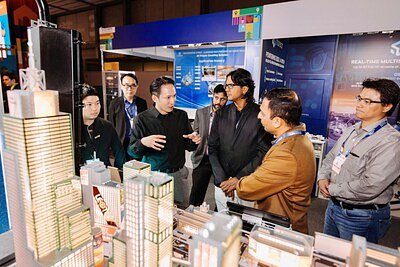
AI Traffic Signals: Leotek Aims to Solve Urban Gridlock with Intelligent Systems
Leotek's AI-powered traffic system is gaining traction in smart city initiatives. Can this technology truly alleviate congestion, boost safety, and pave the way for zero-emission urban mobility?
AI Traffic Signals: Leotek Aims to Solve Urban Gridlock with Intelligent Systems
Barcelona, Spain – November 6, 2025 – As cities worldwide grapple with increasing congestion and the urgent need for sustainable transportation solutions, companies like Leotek are stepping forward with AI-powered innovations. At this year's Smart City Expo World Congress (SCEWC) in Barcelona, Leotek showcased its Interlux AI Traffic Signal System, a technology poised to revolutionize urban mobility – and potentially deliver on the ambitious vision of ‘zero vision’ – zero traffic fatalities and zero urban emissions.
Leotek’s Interlux system isn’t simply about timing traffic lights. It’s a holistic approach to urban traffic management, integrating artificial intelligence, edge computing, and real-time data analysis to predict traffic flow, optimize signal timing, and prioritize emergency vehicles. The system utilizes AVerMedia’s Edge AI solution coupled with NVIDIA’s Jetson Orin Nano platform, enabling it to process data from multiple sensors – including cameras and vehicle detectors – simultaneously, all while preserving privacy.
“The true value of smart mobility isn't merely controlling signals,” explained a Leotek representative at SCEWC, “it’s understanding the complex dynamics of urban traffic and adapting in real-time. This isn’t about reacting to congestion; it’s about anticipating it.”
Spain as a Testbed for Smart City Innovation
Leotek has found a particularly receptive environment for its technology in Spain, where several cities are actively embracing smart city initiatives. The company has deployed Interlux in Madrid and Valencia, showcasing its potential to improve traffic flow and reduce emissions. While definitive, publicly available data on the specific performance metrics remains limited, Leotek claims these initial deployments have yielded promising results.
“Spain is really at the forefront of smart city development in Europe,” notes a European urban planning analyst. “They’re eager to adopt technologies that can improve the quality of life for their citizens and address the challenges of urbanization. Leotek’s solution aligns well with those goals.”
Beyond Timing: The Power of Predictive AI
The Interlux system differentiates itself from traditional traffic signal control systems through its predictive capabilities. By analyzing historical traffic patterns, real-time sensor data, and even external factors like weather conditions, the system can anticipate congestion before it occurs and adjust signal timing accordingly. This proactive approach not only improves traffic flow but also reduces fuel consumption and emissions.
“Traditional systems react to congestion; this system anticipates it,” says a Leotek engineer. “We're leveraging the power of AI to create a truly adaptive traffic management system.”
The system's edge computing architecture is also crucial. By processing data locally, at the traffic signal itself, the system minimizes latency and ensures reliable performance even in congested network conditions.
A Competitive Landscape
Leotek isn't the only player in the smart traffic management market. Established companies like Siemens and Iteris, as well as emerging startups, are all vying for a piece of the action. However, Leotek's focus on AI and edge computing positions it as a strong contender.
“The smart traffic management market is becoming increasingly competitive,” explains a transportation technology consultant. “Companies that can offer innovative solutions that address the evolving needs of cities will be the ones that succeed. Leotek’s approach is certainly compelling.”
Challenges and Future Outlook
Despite the promising potential of AI-powered traffic management, several challenges remain. Data privacy concerns, the need for robust cybersecurity measures, and the complexity of integrating new technologies into existing infrastructure are all hurdles that need to be addressed.
“Implementing these systems requires careful planning and coordination,” notes a city transportation official. “It's not just about installing new hardware and software; it's about changing the way we manage our cities.”
Furthermore, the lack of publicly available, independent verification of the performance claims of systems like Interlux raises questions about their real-world effectiveness. More rigorous testing and data transparency are needed to build trust and accelerate adoption.
Looking ahead, Leotek plans to expand its deployments to other cities around the world. The company is also exploring new applications for its technology, such as integrating with autonomous vehicles and smart parking systems.
The ‘zero vision’ goal – eliminating traffic fatalities and emissions – is an ambitious one. But with continued innovation and collaboration, companies like Leotek are making significant strides towards creating safer, more sustainable, and more livable cities. The company's presence at SCEWC underscored its commitment to driving that transformation, demonstrating that intelligent traffic management is no longer a futuristic fantasy, but a rapidly approaching reality. “The goal isn’t just to move cars faster,” a Leotek representative emphasized, “it’s to create a better quality of life for everyone.”
